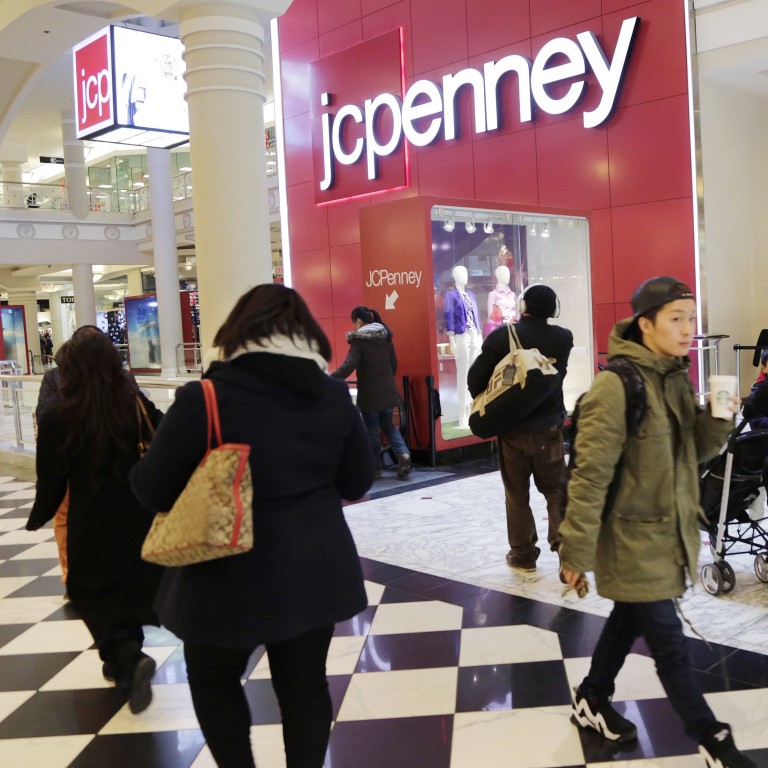
US tariffs on China goods would have ‘striking’ affect on women, families, JC Penney says
- Proposed tax increase ‘disproportionately hits women’s and girls’ apparel’, JC Penney says
- American consumers will ‘pay higher prices,’ according to US retailer
The Trump administration’s proposed tariffs on thousands of Chinese-made products, including apparel, footwear and home goods, unfairly targets women, according to the US retailer JC Penney.
The department store chain said that “though surely inadvertent, the disproportionate impact of the proposed List 4 tariffs on women is striking”.
Of 19 China-sourced apparel items that are of particular concern to JC Penney, 13 are for women or girls, including pullovers, trousers and underwear, the retailer said. Existing tariffs on those products “are already the highest among manufactured goods”, the company said.
“The administration’s proposed tax increase disproportionately hits women’s and girls’ apparel, but this understates the impact on women,” David M. Spooner, a lawyer for JC Penney, said in a letter filed with the US Trade Representative’s office on Tuesday.
“Women often do the shopping for their families, and so feel it acutely when the government increases taxes on basic household items,” Spooner said. “Moms every day carefully work to budget each month’s paycheck. Increasing taxes on boy’s shoes, kitchen appliances, sheets and blankets and curtains, and hundreds of other basic clothing items and home goods, will hurt all moms who don’t have inexhaustible disposable income. It will force them to make tough choices.”
US President Donald Trump has taken a hardline on tariffs this year as he tries to force Beijing to change decades of industrial and trade policy. The US has placed tariffs on nearly half of all Chinese-made goods and is threatening to add 25 per cent levies on another US$300 billion of products, many that would directly affect US consumers.
Analysts and economists have raised concerns in recent weeks that the trade war, if it further escalates and remains extended, could push the global economy into a recession next year.
Retailers and others are asking the US Trade Representative’s office to reconsider proposed tariffs on thousands of products at hearings that are taking place this week and next week in Washington.
Trump and Chinese President Xi Jinping are expected to meet next week at the G20 Summit in Osaka, Japan. A phone call between the two leaders on Tuesday has rekindled the negotiation process.
US consumers face burden of Trump tariffs as retailers weigh price hikes
UBS previously warned that tariffs could reduce sales by US$40 billion for retailers this year and lead to the closure of 12,000 stores in the US.
For JC Penney, the potential stakes are high.
JC Penney has more than 860 stores in the US and Puerto Rico, primarily in shopping malls, and has been a mainstay for middle class shoppers in the past, but has struggled to attract customers in recent years as more Americans move online to shop.
The company brought in a new chief executive, Jill Soltau, from Joann Stores in October after Marvin Ellison left to run Lowe’s Companies. She has revamped the company’s management team in recent months, bringing in executives from McKinsey & Co, Target Corp and The Vitamin Shoppe.
Like many of its bricks-and-mortar counterparts, the company has continued to struggle to attract consumer traffic since she joined the company last year. JC Penney saw its comparable store sales drop 5.5 per cent in the first quarter, after a 6 per cent drop in the fourth quarter.
In February, the company said that it would close 19 stores this year, including several that focused only on home and furniture items.
Maker of bowling shoes, bags struggles to leave China amid tariffs
The latest tariff list targets some 250 categories of goods that JC Penney has raised concerns about, including toys, Christmas ornaments and women’s jeans.
“JC Penney’s core customer simply cannot afford to pay an additional 25 per cent tax on apparel, footwear, and household goods,” Spooner said.
“The numbers are striking: The average US household in the bottom income quintile spends a higher portion of its income on apparel and footwear than wealthier Americans, meaning that tariffs on apparel and footwear hit struggling families more than anyone else,” he said. “Low-income families spend three times as much of their after-tax income on apparel and services than high income households.”
Retail rival Macy’s also has raised concerns about the proposed tariffs, saying they would cause economic harm to its customers.
Brace for a costly shopping season as US toymakers cope with tariffs
“Families who shop at Macy’s should not be required to face potential tax increases on back-to-school shoes, sweaters, and pullovers for the fall, or, for that matter, on baby clothes,” the company said in a letter to the US Trade Representative’s office. “Yet all of these items are on the USTR’s proposed list.”
The company, which counted jewellery and apparel as its top performing divisions in the first quarter, also said it has no easy alternative in the short term to replace its products that are sourced in China. Doing so would require a minimum of two to five years lead time for each product assuming “another realistic source exists”, the company said.
JC Penney has been trying to move part of its production out of China for several years, cutting its share of China sourcing in its private brands business by 50 per cent over the past decade, the company said.
“Supply chains, particularly the supply chains of retailers, are intricate. It is not easy to quickly change suppliers while meeting the customer’s needs and expectations,” Spooner said. “If implemented, the proposed Section 301 tariffs on apparel, footwear, and household goods detailed in these comments will have to be added to the cost of the products. That means consumers will pay higher prices.”

